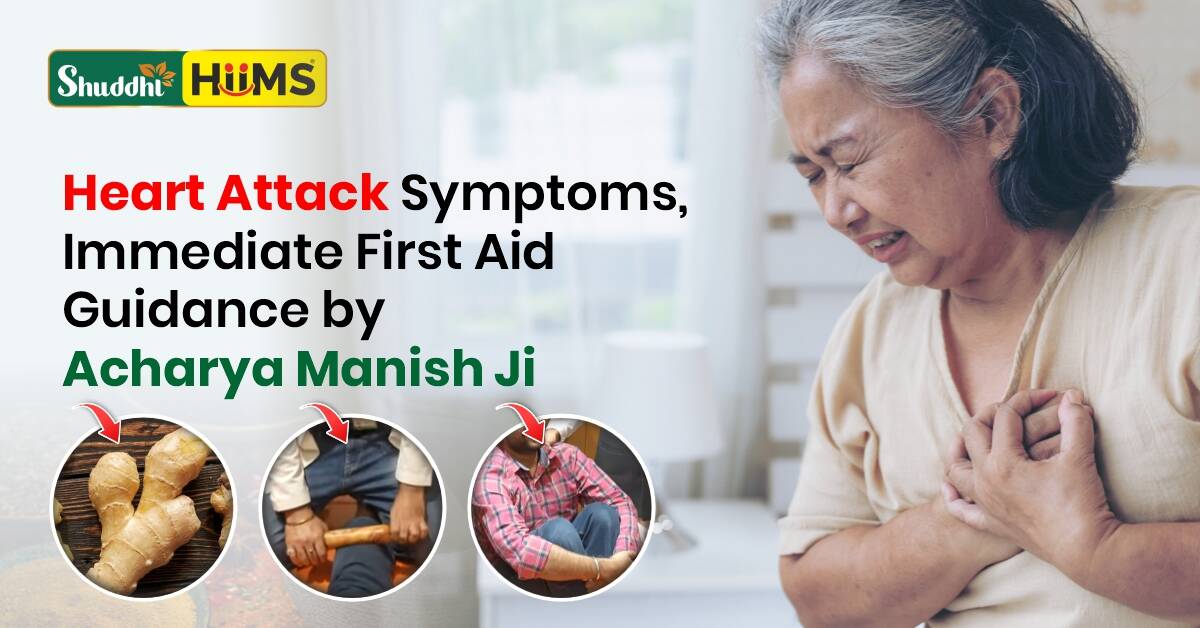Heart Attack Symptoms, Immediate First Aid Guidance by Acharya Manish Ji

06 Oct, 2025
Heart Attack Symptoms, Immediate First Aid Guidance by Acharya Manish Ji
A heart attack often comes suddenly, leaving very little time to react. Recognising Heart Attack Symptoms early and knowing how to respond can make a big difference. Mild chest pain, uneasiness, or shortness of breath are usually ignored by most of us, not realising these may be heart attack warning signs. Many times, people mistake the discomfort for acidity or stress, delaying timely action. Every minute during such an emergency is precious, and the right guidance can save someone’s life.
Acharya Manish Ji has explained simple yet effective emergency steps that can help keep a person stable until medical help arrives. His approach combines practical first aid actions with natural wisdom, showing how everyday things like ginger and acupressure can support the heart in critical moments. In this article, we will understand the key signs of a heart attack, immediate first aid measures to follow, and Ayurvedic tips to strengthen the heart naturally.
Heart Attack Warning Signs and Common Symptoms
Being aware of heart attack signals helps in taking timely action and reducing complications. A person may not always experience sudden severe chest pain; sometimes the signals are subtle and appear days before. The most commonly observed Heart Attack Symptoms include:
1. Tightness or heaviness in the chest lasting for several minutes.
2. Pain spreading to the arm, neck, back, or jaw.
3. Shortness of breath, uneasiness, or a burning feeling in the chest.
4. Excessive sweating, dizziness, fatigue, or nausea.
Along with these, there are heart attack warning signs that may show up earlier, such as frequent tiredness, disturbed sleep, swelling in the legs or feet, and irregular heartbeat. People often mistake these signs for indigestion, stress, or weakness, but ignoring them can be dangerous.
Men often feel sharp chest pain, while women may notice discomfort in the back, neck, or stomach. Acharya Manish Ji advises paying close attention to such patterns and seeking timely medical consultation, as early action can save lives.
Immediate Heart Attack First Aid Steps by Acharya Manish Ji
In a situation where someone suddenly collapses or shows intense chest pain, panic usually takes over. But knowing the right Heart attack first aid steps can provide life-saving support before professional help arrives. According to Acharya Manish Ji, these are some useful actions:
1. Sit Upright, Do Not Lie Down – The patient should be seated in a comfortable upright position to reduce pressure on the heart.
2. Chew Fresh Ginger – Acharya Ji recommends giving the person a piece of raw ginger to chew. The sharp taste stimulates circulation and keeps the patient conscious until doctors arrive. This highlights the benefits of ginger for heart emergencies.
3. Apply Pressure Points – Pressing specific points, such as between the thumb and index finger area or the calf muscles, helps stimulate blood flow. Families are advised to keep wooden rollers or similar items at home to press the calf muscles during such crises.
4. Call for Medical Help Immediately – While these methods are effective for temporary relief, emergency services must be contacted without delay.
These steps, when followed quickly, can keep the patient stable until they receive hospital treatment.
Emergency Care for Heart Attack
Every minute counts during a heart attack. Immediate actions like keeping the patient calm, providing fresh air, and avoiding unnecessary movement are vital. This kind of emergency care for a heart attack helps prevent further strain on the heart.
If the person is alone, Acharya Ji advises sitting upright and chewing ginger until help arrives. The intense effect of ginger often triggers tears in the eyes, which indicates the body is responding. Such simple household remedies can work as a bridge until advanced treatment is given.
Natural Remedies for Heart Health
Long-term safety of the heart depends on everyday habits. Ayurveda offers many natural remedies for heart health that focus on balance rather than quick fixes. These include:
1. Drinking warm water with a pinch of turmeric to maintain circulation.
2. Using garlic and ginger in daily meals.
3. Practicing regular yoga postures like Anulom Vilom and Pranayama for better oxygen flow.
4. Avoiding excessive oily and heavy foods that burden the digestive system.
These methods may look simple, but when followed consistently, they help in maintaining the strength and flexibility of the heart. Incorporating Ayurvedic tips for heart health, such as mindful eating, meditation, and gentle exercise, can further improve overall cardiac well-being.
Benefits of Ginger for the Heart
One of the simplest home ingredients, ginger, plays a crucial role in keeping the heart active. The benefits of ginger for heart include improving blood flow, supporting digestion, and preventing heaviness after meals. In emergencies, as shared by Acharya Ji, chewing raw ginger helps the body stay alert and responsive until doctors take charge.
Conclusion
Heart attacks strike without warning, but being aware of Heart Attack Symptoms and knowing quick responses can save lives. Acharya Manish Ji’s guidance reminds us that natural wisdom, like chewing ginger or applying pressure points, can work effectively until medical professionals take over. Along with emergency actions, following Ayurveda and lifestyle-based practices keeps the heart strong and resilient in the long run. A balance of awareness, timely first aid, and preventive habits ensures safety for both you and your loved ones.
FAQs
1. What are the first signs of a heart attack?
Chest pain, shortness of breath, and sweating are common early signs.
2. How do heart attack signs differ in women?
Women may feel discomfort in the back, neck, or stomach instead of sharp chest pain.
3. What are the quick steps to take in a heart attack?
Sit upright, chew raw ginger, press calf muscles, and call for medical help.
4. What natural remedies that are useful for heart health?
Daily use of garlic, ginger, yoga, and warm water with turmeric.
5. What Ayurvedic tips for heart health are suggested?
Eat light food, meditate, walk daily, and follow detox practices.





